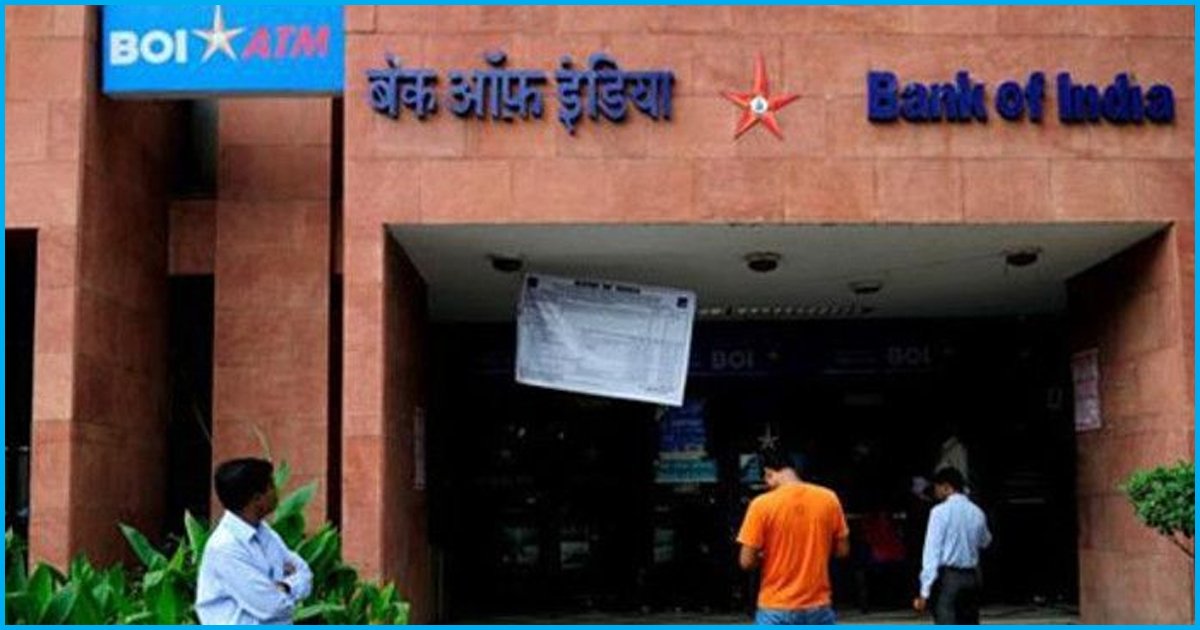
Bank Of India To Levy Charges On Free Services From Jan 20; Will Other Banks Follow Suit?
11 Jan 2018 6:27 AM GMT
Bank of India will be implementing a new set of charges from January 20 onwards. Some of the free services to be charged are cash withdrawal and deposit, KYC, change of address and mobile number, net banking, cheque book requests, cheque deposit, passbook updation, signature verification, etc.
Which of the present free services will be chargeable?
| ACTIVITY | PRESENT | PROPOSED |
| Cash withdrawal | No charge for cash withdrawal up to maximum Rs 50,000 allowed only to account holder by self-cheque | Rs 10 per transaction (auto debit) |
| Cash deposit | No charges for cash deposit of any amount | Cash deposit of maximum Rs 2 lakh allowed per day
|
| Passbook updation | No charges | Rs 10 per updation (auto debit) |
| Balance statement | No charges | Rs 25 per statement (auto debit) |
| Cheque book request | No charges | Rs 25 per statement (auto debit) |
| Signature verification/ Photo attestation | No charges | Rs 50 per request |
| Issue of DD/PQ/ECS | No charges | Rs 25 per request |
| Cheque deposit | No charges | Rs 10 per cheque plus speed clearing charges |
| Fund transfer (NEFT, RTGS, etc) | No charges | Rs 25 per request for amount up to Rs 2 lakh and Rs 50 for amount above Rs 2 lakh (auto debit) |
| Communication address/ mobile number updation | No charges | Rs 25 per request |
| KYC updation | No charges | Rs 25 per request |
| Duplicate passbook/ FDR receipts | No charges | Rs 50 per request |
| Request for Internet/ Mobile banking/ Insta PIN/ Star token/ Password unblocking | No charges | Rs 25 per request for internet/ mobile banking and Rs 10 for insta PIN/ other requests |
| Request for debit cards | No charges | Rs 25 per request (auto debit) |
| Interest certificate | No charges | Rs 50 per certificate |
Apart from the above charges, there will be the following debit card charges:
- ATM card maintenance charges in metro & urban area – Rs 120
- ATM card maintenance charges in semi urban & rural area – Rs 60
- Card reissuance on loss (replacement card charges) – Rs 120
- Additional card charges – Rs 120
- EMV debit card issuance charges – Rs 125
All the above charges are for intersol activities. Meaning, services availed not that the home branch but at other branches of the bank. The date for implementation of the charges is January 20.
Will other banks also withdraw free banking services?
The Indian Banking Association (IBA) said in a press release, that there is “neither a move by banks for such a blanket removal of free services nor such a thing is being contemplated.” However, the representative body for Indian banks added that “banks looking at its commercial and operational costs would constantly examine and revise charges as the case may be.”
Rajeev Kumar, Secretary of the Department of Financial Services (DFS), Ministry of Finance, also called the news a ‘rumour’.
No proposal by Banks to discontinue free services from 20th January. Pure Rumours. Pl Ignore , advises Indian Banking Association clarifying that rumours in section of social media are baseless and no such blanket [email protected]@[email protected]@ ANI
— Rajeev kumar (@rajeevkumr) January 10, 2018
However, Mid-day reported that both private and nationalised banks will be implementing a new set of charges. A senior bank official from a nationalised bank told the daily, “The move will encourage paperless banking and over a period of time, even cheques and demand drafts will be completed done away with. ATMs and kiosk machines have been put up, where updating passbooks, transfer of funds can still be done with no charges.”
The Logical Indian spoke with officials of both private and public sector banks who said that an internal communication regarding new charges has been intimated to them, however, they remain unsure if the same will come into force.
Financial Express reports that some leading banks of the country are mulling over the option of levying hefty charges on almost each and transaction or services offered by them.
It remains unclear if BoI’s move will be echoed by other banks due to conflicting reports. However, with the Indian banking sector running in loses, levying charges on free services will be of great help. According to the report by Bloomberg, SBI earned Rs 1,772 crore in minimum balance penalty during April-November 2016, which was more than its second-quarter profit.
Needless to say, the current situation of Indian banks can be linked to big corporations defaulting on their loans. To force depositors to bear the burden of their failure takes away what the banking system was established for – to protect customers’ money.
 All section
All section













